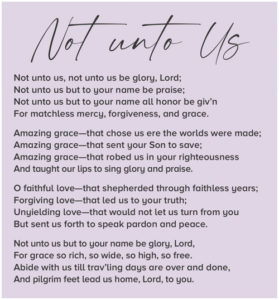 |
Nothing else we experience can compare to the grace of God the Father.
Hey, Dad. You know that convenience store that makes those incredible milkshakes? The other evening my car’s on empty. On my way to that store to get gas, I order four milkshakes, one for everybody at the house. But when I get there, none of the payment apps on my phone will work. I don’t have my wallet along. No credit cards or cash.
I call Emily, and she reads me her credit card number. But when the clerk tries to complete the transaction that way, the system says, “Card cannot be entered manually.” So I’ve still got an empty gas tank, the milkshakes are ready, and I’m stuck trying to work out a way to pay.
This customer at the other register, a guy maybe in his 50s, asks, “You need gas?”
“Not really,” I tell him. “I’ve just never had this problem before with the payment apps on my phone.”
“Yeah,” he says, “but do you need gas?” “
Well, it’s not like some desperate need,” I say. “Besides, I’ve also ordered four milkshakes.”
“But, hey, do you need gas?” he insists.
“Well, I suppose,” I say. So he takes out his credit card and pays for my gas and the four milkshakes.
“How am I supposed to pay you back?” I ask.
“No need to,” he says. “I can afford this.”
“I’m so sorry, sir,” I tell him. “I don’t know how to take this.”
“What are you sorry for?” he says. “I’m glad to do it.”
He walks outside and climbs into his truck. As he drives past where I’m filling up my car, he rolls down his window to wish me a good evening. I thank him for about the fifth time. He says, “I’ve got a daughter of my own. I know how these things can happen. Besides, maybe someday you can pay it forward.”
A story of grace
That’s a story of grace, isn’t it? But how does it compare to God’s grace?
A man noticed that someone else was in need. So did God, who saw that our need was for much more than fuel and food. God observed our need for freedom from the fear of death and hell, and he knew we couldn’t do anything about it.
Rather than taking the easy route and minding his own business, a man stepped forward and paid a price. So did God, who stepped forward with his own Son and paid the much steeper price of giving him up for us all.
A man saw his way past feeble excuses and apologies, including the pride of doing it independently. So did God, who heard all of our excuses and apologies and saw his way to provide redemption at the cross.
A man expected nothing in return. So did God, whose grace is so perfect there is nothing we must do to complete it.
A man gave gladly and then urged the recipient of his grace, “Pay it forward.” So does God, who gladly loved us first and then motivates us to pass it along to those who cannot pay us back.
No need for misgivings
Do you have misgivings about that fellow who helped my daughter? What motivated him? Did he perceive this as an opportunity to take advantage? Or was he trying to soothe his guilty conscience for all the occasions when he had refused to step forward? Was he hoping to plant good karma so later on he might reap good things for himself?
For centuries people have been puzzling over God’s grace as well. An acquaintance once accused God of using grace to manipulate wretched sinners. Another reasoned God just wants to bring honor to himself. Still another portrayed God as that lonely soul willing to do whatever it takes to win our affection.
The Holy Spirit needs to clear up our misunderstandings with God’s Word, doesn’t he?
Through St. John, the Spirit points out that God’s grace has never been limited to the few who will honor his name for it. “God so loved the world that he gave his one and only Son” (John 3:16). “He is the atoning sacrifice for our sins, and not only for ours but also for the sins of the whole world” (1 John 2:2).
Through St. Paul, the Spirit warns us sinners not to justify ourselves with our obedient deeds. “You who are trying to be justified by the law have been alienated from Christ; you have fallen away from grace” (Galatians 5:4). Instead, the Spirit stresses that God gives away his grace free of charge after our Redeemer paid for it with his blood. “All have sinned and fall short of the glory of God, and all are justified freely by his grace through the redemption that came by Christ Jesus” (Romans 3:23,24).
The epistle of grace
When asked to explain what it means to be Lutheran, many of us will focus on God’s grace. I know of one Lutheran who always takes his listeners to Ephesians 2. That’s where Paul jolts his readers with the announcement that at one time all of us were dead in our transgressions and sins and by nature deserving of God’s wrath. But God “made us alive with Christ . . . it is by grace you have been saved” (v. 5). Paul writes that in the coming age God will show us “the incomparable riches of his grace” by expressing it “in his kindness to us in Christ Jesus” (v. 7).

Then comes the gem that none of us can examine too closely or ponder too frequently: “It is by grace you have been saved, through faith—and this is not from yourselves, it is the gift of God—not by works, so that no one can boast” (vv. 8,9). True enough, there is a “pay it forward” component to God’s saving grace. Yet even that doesn’t begin with our own good intentions. “We are God’s handiwork, created in Christ Jesus to do good works, which God prepared in advance for us to do” (v. 10).
Rich, wide, high, free
Almost 50 years ago, the late Pastor Kurt Eggert penned a hymn, “Not unto Us” (Christian Worship 582), often sung when Lutherans celebrate the blessings of the Reformation. Those who sing his lyrics honor God’s name for his matchless grace with phrases and imagery from all over Holy Scripture.
Eggert’s hymn leaves us wondering whether anything we observe on a merely human level can compare with what God keeps giving—choosing, forgiving, saving, robing, loving, and shepherding us with “grace so rich, so wide, so high, so free.” Apparently nothing else we experience can compare to the grace of the Father, who for the sake of his Son steps forward to meet our needs again and again.
Author: Paul Zell
Volume 109, Number 10
Issue: October 2022







